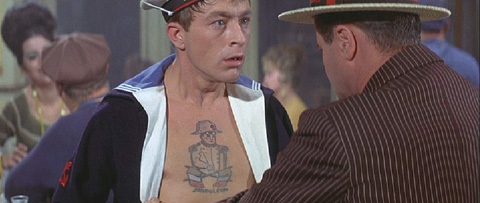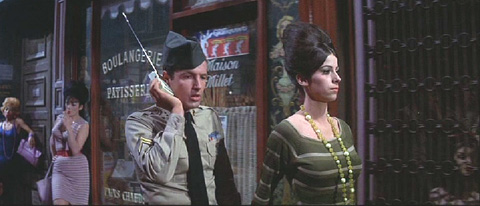| I
suppose that some of you younger guys look at today's movies and these
older films and think that people have really changed in the past few
years. I suppose some of that is true, but not as much as you
think.
Don't think that life for a low-rent Paris streetwalker in 1963 was like the life pictured in this film. They didn't live in ornately decorated lofts, and they didn't get rid of their gorilla-like pimps by saying "now get out of here, ya big galoot", and they didn't have perfect teeth and they probably weren't surrounded with colorful, loveable cafe owners. This was a romantic fantasy, in the same sense that Pretty Woman was a different kind of romantic fantasy about the same subject a couple of decades later. Their real life was filled with brutal johns, exploitative police and pimps, venereal disease, and a complete lack of proper medical and dental care. They probably drank or took drugs in vast quantities, and they rarely resembled Shirley MacLaine. They lived amidst brutality, violence, and squalor. In other words, they didn't look much different from hookers in the Bronx in 2001, except maybe for the ethnic composition. In other words, it isn't people that have changed, but movies. Romanticism moves in and out of vogue. Realism takes hold. Perhaps the cycles reverse or repeat. A film would have portrayed the whole scene much differently if it were made in 1973 after the worldwide counter-cultural revolution, sexual liberation, women's lib, and so forth. But by the time Pretty Woman came along, the gritty realism of the early 70's was out of fashion again, and hookers got perfect teeth once more. Now, in the post-Tarantino age, the scale seems to have tipped again toward realism, or at least toward ugliness. Irma la Douce is pretty much of a mindless fairy tale, and is a prisoner of its age in many ways. Yet it has a fascinating na´vetÚ, a sweetness and innocence that will suck you right in. In fact, it's like watching a Broadway musical without the music, and even the Paris street scenes seem to be painted theatrical backdrops, absent the grime and graffiti of real streets. Who better to reflect this unthreatening innocence than its star, Jack Lemmon, whose very presence suggests he would ask a woman's permission to kiss her, and would have his eyes downcast and be stuttering while he did so. And yet, Irma has an amoral core to it. Underneath all the sweetness is an anarchy that says these people are nice because they ignore the sensible moral rules of sensible people. I like that. It gives the film just enough edge to make it fresh today. You see, Irma (MacLaine) is a streetwalker, and Jack Lemmon is the world's most honest cop, who is shocked, shocked and appalled, to determine that there is lovemaking for profit going on in a hotel with no overnight guests! So he busts the place, which proves not only disruptive to the local economy, but also fatal to his career, since one of the johns is the chief inspector. Of course, the film is already straying far from the movie code of that era, since it is proclaiming that prostitution is the natural order of things, and anyone choosing to close it down is immoral and dangerously anti-capitalist. In the course of his losing his police job, he kinda falls for Irma, and he ends up defending her from abuse by her pimp. When he doggedly brings the pimp down in a fight, he wins the girl. Now here is where the story becomes totally amoral. She can't go back to the pimp, because he'll really kick the hell out of her, and she isn't just going to give up her profession and get a job flipping burgers. In fact, she talks about what a sucker her mom was for giving up her own lucrative clientele to get married and have a baby. She needs a new pimp. Guess who is elected? Remember he's in love with her, and the last thing he wants is for her to sleep with other men, but he has no job and can't support them, and she can only earn money doing what she does, so even though he's love-struck, and jealous of everyone, he sells her nightly. Can you imagine that in an American movie in 1963? That's amoral even by today's standards for American romantic comedies. I suppose they snuck it through by making all the characters French, therefore excusing the film itself, which was ostensibly simply recording their Gallic amorality. At any rate, he conceives of a scheme to solve his jealousy problem. Irma mentions that she once had a client who paid her enough to be his exclusive personal concubine. Lemmon thinks about it and concocts a perfect plan. He will disguise himself as a stuffy, impotent English gentleman who pays Irma enough to be his personal companion, and will work as many hours of manual labor as he needs to in order to finance this operation. Of course, this leaves him too tired to enjoy her company, which kind of defeats the whole purpose of the scheme. Of course, this is not meant to be taken seriously. The plot keeps winding on forever, with about a zillion more silly twists, and it's a fairy tale. All the plot threads are resolved in convenient, completely impossible ways, with even a hint of supernatural assistance. Don't worry about it. It is completely dumb, because it is supposed to be. Just enjoy some old-fashioned cornball humor. Billy Wilder wrote and/or directed some of the greatest comedies in film history, and a few good films of other types as well. He represented a perfect blend of European sensibility and American marketing savvy, a guy who never underestimated the intelligence of the audience, but also believed that his job was to entertain. His film credits read like a list of the all-time great films: The Apartment, Some Like It Hot, Sunset Boulevard, Double Indemnity. As a writer, he has 29 films rated above 7.0 at IMDb, 15 of those rated above 7.5, which is the cut-off point for IMDb's top 250. Of those fifteen movies, he also directed twelve of them! To put it another way, the top 250 includes non-Wilder films only because he couldn't make enough movies to fill the whole list. Irma la Douce isn't even one of his twenty best films, but for many directors it would be a career highlight. Jack Lemmon was one of Wilder's favored players, possessing as he did exactly the right combination of reticent upper class manners, genial good humor, and an inherent kindness that shines through every part he ever played. If ever there was a prototype for a "nice" guy, it was Jon Uhler Lemmon III, the perennial Harvard undergrad from nearby Newton, Mass, who won two Oscars and was nominated for six others. Known and beloved in his twilight years as America's most devoted bad golfer, Lemmon passed away this June, aged only 76. His last screen appearance came in The Legend of Bagger Vance, playing golf alone, in twilight, for the love of the game, in a beautifully photographed scene that almost seems like Lemmon writing the perfect epitaph for himself. |
|
|
|
"Don't make me mad. You wouldn't like me when I'm mad." |


